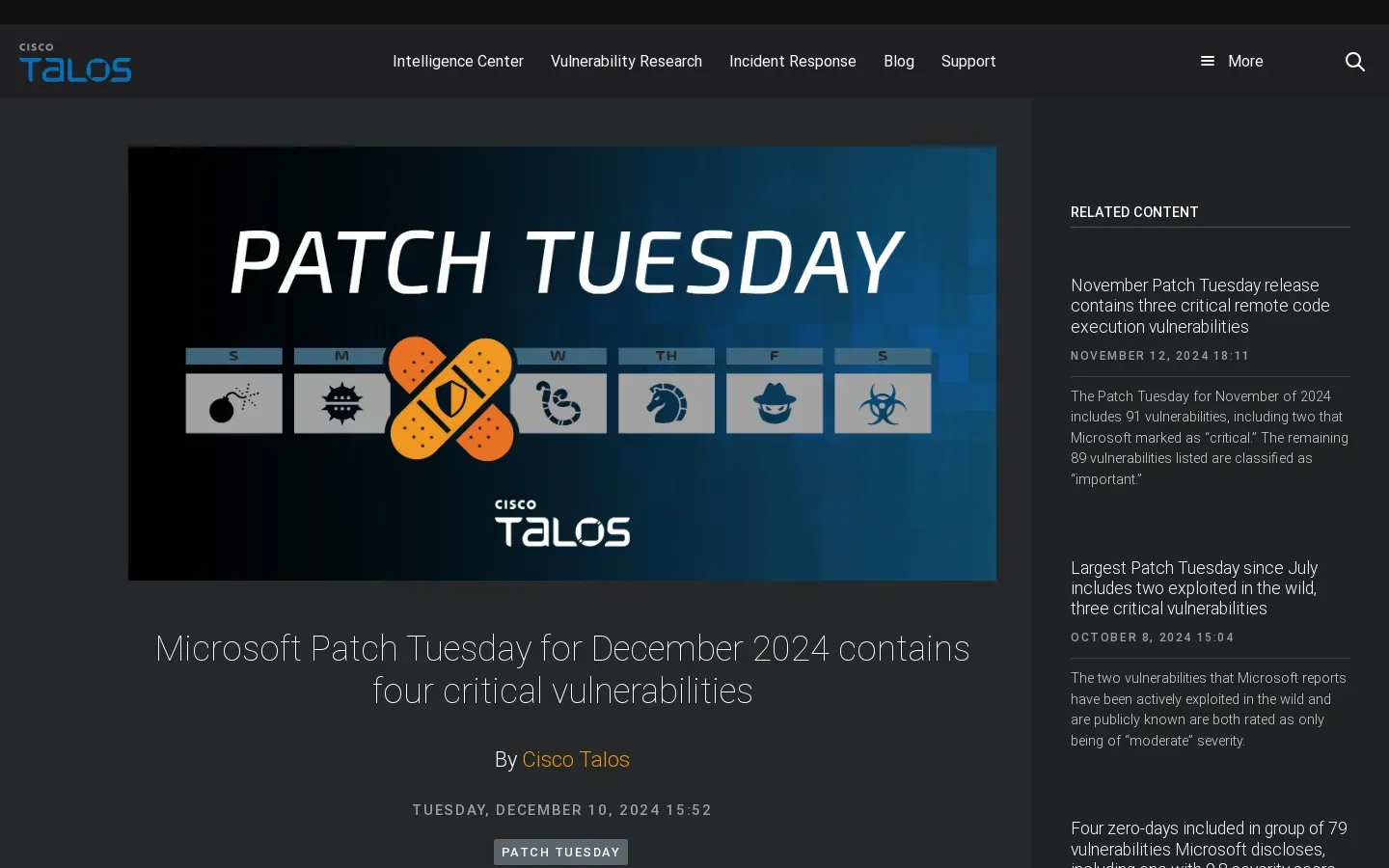
Microsoft December 2024 Patch Tuesday Addresses Four Critical Vulnerabilities
/ 3 min read
Quick take - On December 10, 2024, Microsoft released its Patch Tuesday update addressing 72 security vulnerabilities, including four classified as critical, emphasizing the need for users and IT administrators to promptly apply updates to enhance cybersecurity.
Fast Facts
- On December 10, 2024, Microsoft released its December Patch Tuesday update, addressing 72 security vulnerabilities, including four classified as “critical.”
- The critical vulnerabilities include CVE-2024-49112 (CVSS score 9.8), which allows arbitrary code execution via LDAP calls, and CVE-2024-49124 and CVE-2024-49127, which enable unauthenticated attacks on LDAP servers.
- CVE-2024-49126 allows remote code execution on server accounts without privileges, but requires a complex “race condition” to exploit.
- CVE-2024-49105, found in a remote desktop client, is also critical but assessed as “less likely” to be exploited.
- Organizations are urged to apply the updates promptly to protect against potential unauthorized access and enhance cybersecurity.
December 2024 Patch Tuesday: Addressing Critical Security Vulnerabilities
On December 10, 2024, Microsoft, in collaboration with Cisco Talos, released its latest Patch Tuesday update, addressing a total of 72 security vulnerabilities across various software platforms. Among these, four have been classified as “critical,” underscoring the urgency for users and IT administrators to implement updates promptly.
Critical Vulnerabilities Demand Immediate Attention
The December Patch Tuesday release is part of Microsoft’s ongoing efforts to bolster the security of its products by preemptively addressing potential threats. While Microsoft has assessed the likelihood of exploitation for these critical vulnerabilities as “less likely,” the inherent risks necessitate immediate action to safeguard systems against potential attacks.
CVE-2024-49112: A High-Risk Threat
One of the most severe vulnerabilities addressed is CVE-2024-49112, which carries a CVSS score of 9.8. This vulnerability allows for arbitrary code execution through LDAP (Lightweight Directory Access Protocol) calls. Systems utilizing LDAP for directory services are particularly at risk, making it imperative for organizations to prioritize this update.
Exploiting LDAP Servers: CVE-2024-49124 and CVE-2024-49127
CVE-2024-49124 and CVE-2024-49127 present additional critical threats by enabling unauthenticated attackers to exploit LDAP servers via specially crafted requests. These vulnerabilities highlight the need for heightened vigilance and prompt patch application to prevent unauthorized access and potential data breaches.
Remote Code Execution: CVE-2024-49126
Another significant vulnerability, CVE-2024-49126, permits remote code execution on server accounts lacking privileges. However, exploiting this vulnerability involves executing a complex “race condition,” which may limit the pool of potential attackers. Despite this complexity, organizations should not underestimate the threat and should apply necessary patches without delay.
Remote Desktop Client Vulnerability: CVE-2024-49105
CVE-2024-49105, identified in a remote desktop client, also falls under the critical category. Although deemed “less likely” to be exploited, it remains crucial for users to update their systems to mitigate any potential risks associated with this vulnerability.
Implications and Recommendations
The implications of these vulnerabilities are profound, as they could potentially allow unauthorized access to sensitive systems and data. Organizations are strongly encouraged to implement the December Patch Tuesday updates promptly to mitigate these risks and enhance their overall cybersecurity posture.
As cyber threats continue to evolve, staying updated with the latest security patches is essential for safeguarding information and maintaining operational integrity. IT administrators should prioritize these updates and ensure that all systems within their networks are adequately protected against these newly identified vulnerabilities.



